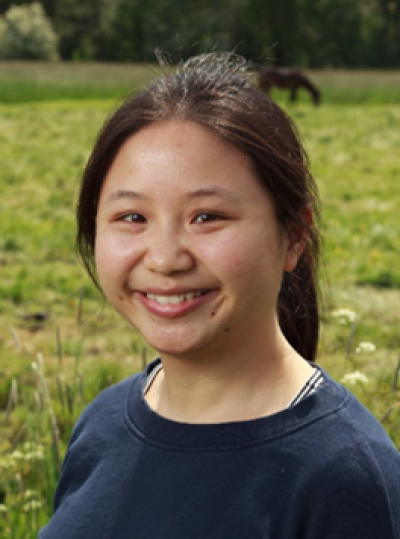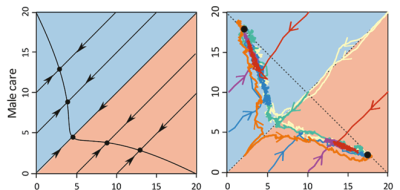About me
I am a PhD student at the University of Groningen in the groups of Franjo Weissing (Modelling Adaptive Response Mechanisms) and Jan Komdeur (Behavioural Evolutionary Ecology). My research is currently focused on the causes and consequences of sex differences in parental roles – a topic that I investigate through phylogenetic comparative methods and theoretical modelling.
View my cv here.
Research topics
How does ecology, life history and social environment predict parental cooperation in birds?
Bird species differ considerably in their parental care patterns (intensity of care, sex differences in partental roles). Researchers have linked these patterns to differences in ecological factors, life-history and social conditions, but a robust empirical test of the importance of these predictors is still lacking. Here I collected the most comprehensive dataset of parental care patterns in birds (including 1101 bird species from 119 families). By means of a phylogenetic analysis, I investigated how parental cooperation is associated with ecological parameters (e.g., nest type, diet), life history characteristics (e.g., body size) and social factors (e.g., coloniality).
Preprint: https://www.biorxiv.org/content/10.1101/2020.12.24.424295v1
Individual variation in parental care drives divergence of sex roles
In animals, species differ remarkably in parental sex roles. For instance, biparental care predominates in birds, while female-biased care predominates in mammals, and male-biased care predominates in teleost fishes. Moreover, parental care patterns can be highly diverse even within the same population. In the last two decades, theoreticians built mathematical models to explore the evolution of sex differences in parental roles. However, these analytical models are only tractable if numerous simplifying assumptions are made. To overcome this limitation, I studied the evolution of parental sex roles by individual-based evolutionary simulations. In this study, I uncovered how the evolution of parental sex roles can lead to the emergence of individual variation; in turn, this variation strongly affects the outcome of evolution, leading to very different conclusions and predictions than current sex role theory: (1) Our model predicts the evolution of non-egalitarian care even if the two sexes have the same life history parameters and care is egalitarian at the start. (2) As predicted by Trivers, the sex with the highest pre-mating investment is typically selected to provide most post-mating care. Hence, Trivers was right although his line of reasoning was wrong. (3) The interplay of parental care and sexual selection is more intricate than suggested by current theory; there are alternative equilibria, and the evolution of asymmetric care precedes the evolution of mate choice, rather than being driven by sexual selection. (4) Parental care patterns are evolutionarily labile, switching rapidly between equilibria without a change in environmental conditions.
Preprint: https://www.biorxiv.org/content/10.1101/2020.10.18.344218v1
Not the sex ratio, but sex-specific mortality drives the evolution of parental roles
Many studies suggest that sex differences in parental behavior are related to biases in the sex ratio. Traditionally, the operational sex ratio (OSR, the male:female ratio among the individuals participating in mating) has been viewed as a major determinant of paternal sex roles. Recently, this view has been challenged. Instead, the adult sex ratio (ASR, the male:female ratio in the adult population) is viewed as a crucial factor in the evolution of parental roles. However, the causal relationship between sex ratio biases (either OSR or ASR) and parental sex roles are often not clear. Here, I investigated the evolution of sex ratios (OSR and ASR) and parental sex roles in an indvidual-based evolutionary model. By systematically changing life history characteristics (e.g. maturation rate, mortalities at different life stages) in a sex-specific manner I studied how the two sex ratios match to evolved parental sex role. The main conclusion is that neither OSR nor ASR are drivers of parental sex roles, as the same parental patterns evolved under diverse combinations of OSR and ASR. In contrast, sex differences in life history characteristics are a good predictor of sex differences in parental care.
Preprint: coming soon!
Joint evolution of primary sex ratio and parental investment
According to Fisher’s Equal Allocation Principle, parents should invest equal amounts of their parental resources in producing sons and daughters. This implies that the ‘cheaper’ sex should be overproduced when sons and daughters require different amounts of resources. In the models underlying Fisher’s Equal Allocation Principle, the investment per son and per daughter is typically viewed as a constant model parameter. In contrast, I here consider an individual-base evolutionary model where the investment per son and daughter is an evolvable property that coevolves with the primary sex ratio. For various scenarios, my simulations yielded consistent and repeatable results, which in the majority of cases led to strong violations of Fisher’s Equal Allocation Principle. Instead, much intricate sex ratio and parental care patterns evolved, which sometimes even resulted in the overproduction of the more expensive sex. In many scenarios polymorphic populations emerged where some parents predominantly produce and care for sons, while the other parents focus their care on daughters.
Preprint: coming soon!
Condition-dependent sexual selection and the evolution of parental sex roles
When trying to understand the evolution of parental sex roles, most models in the literature assume that the evolving strategies reflect a parent’s genotype, rather than the parent’s phenotypic or environmental condition. It is well-known that evolutionary outcomes can change a lot (quantitatively and qualitatively) when strategies are not fixed, but made dependent on local circumstances. By means of individual-based simulations, I will study the evolution of mating and parental strategies in situations where individuals can make their behaviour dependent on their own state and on their local environment.




